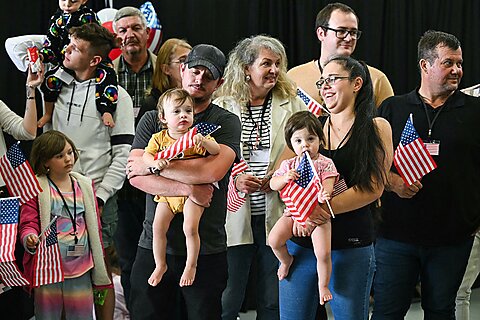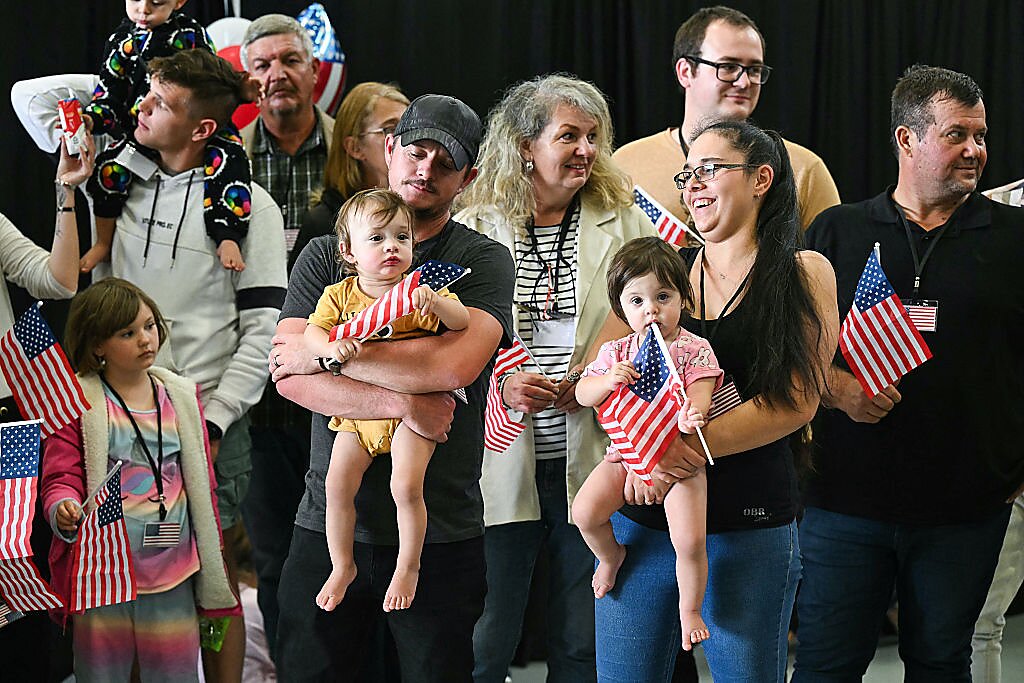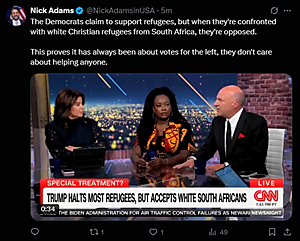Alex Nowrasteh
In practice, the president decides which immigrants are legal, illegal, refugees, or unworthy under current US immigration law. Nowhere is this clearer than in President Donald Trump’s recent order admitting Afrikaners from South Africa as refugees after cancelling the rest of the refugee program. The admission of 59 Afrikaner refugees from South Africa is the first use of the refugee program since it was shuttered on January 27, 2025, prompted by a later executive order about abusive government policies in South Africa. There will be more flights of Afrikaner refugees to the United States.
Afrikaners should be allowed to immigrate to the United States. The benefits to both the refugees and the United States are large.
According to the 2023 American Community Survey (1‑year), over 53,000 white South African immigrants are in the United States. That’s an imperfect proxy for Afrikaner immigrants, but the overlap is large enough to confidently describe the population.
This week’s refugee charter flight increased the white South African immigrant population by over 0.1 percent. Their median age is 47.6, slightly above 46.8 for all immigrants, and well above the 37.1 median for native-born Americans. Sixty-two percent of those 25 years or older have college degrees or above, well over the native-born rate of 36.4 percent and the immigrant rate of 35 percent. Their high education levels are reflected in a high median household income of $130,000, compared to the median household income of $77,555 for native-born Americans and $78,662 for immigrants. They are also very entrepreneurial, with self-employment rates over 13 percent, compared to 5.4 percent for native-born Americans and 8.2 percent for all immigrants. It’s safe to assume the Afrikaners benefit because they chose to come here.
Regardless of the benefits of admitting these refugees, there are many unusual aspects of how the Afrikaner refugees were admitted. None of the following is intended to reflect poorly on the Afrikaners, who are rightly seizing an excellent opportunity for themselves and their families, but the peculiarities are worth noting.
Rarely are refugees screened and processed in their home countries, as Afrikaners were. In virtually all cases, refugees must first flee their home countries, register with the United Nations, and then start the process of being admitted as a refugee to the United States. There have been small exceptions to this in the past, such as with the Central American Minors (CAM) Program that allowed some minors and young adults from El Salvador, Guatemala, and Honduras to enter the US as refugees if they had a parent or legal guardian lawfully present in the United States. CAM is more restrictive than normal refugee processing because it requires a family connection to the US, which the Afrikaner refugee program doesn’t require. It’s somewhat similar to the Orderly Department Program (1979–1997) that allowed some Vietnamese refugees to fly directly from Vietnam to the United States, which was created to avoid refugees drowning on boats.
The Trump administration sent a chartered flight, funded by the US government, directly to Johannesburg to pick up the refugees. This is unusual and typically only happens when there is an urgent humanitarian or national security reason that doesn’t apply here. The US chartered several major flights for about 20,000 Kosovar refugees in 1999, but they came from refugee camps in Macedonia, and the US government was involved in that conflict. The most similar recent action is the American evacuation of Afghans when the Taliban took over that country, but they were not admitted as refugees.
The Freedom Flights from Cuba to the United States, which took place before the creation of the modern refugee program, are an older example. Under the standard refugee system, the US government generally pays for commercial airline tickets up front, which the refugees must eventually repay.
The Afrikaner refugees were processed more rapidly than any other refugee group in modern history. Refugees must usually wait about 24 months and rarely ever less than 18 months for admission to the United States once they begin the process. Refugees begin their immigration following a referral to the US Refugee Admissions Program by the UN or other groups, which is then followed by prescreening interviews and security checks that can take more than a year. After that, the Department of Homeland Security does additional legal and security reviews, and then there’s medical screening, cultural orientation, and travel prep.
Regardless of whether the administration started the process of admitting these refugees on January 20 or when the administration issued its executive order on February 7, Afrikaners were screened and admitted more rapidly than any other refugee group since the creation of the modern refugee system in 1980.
The South African government clearly discriminates on the basis of race through its Black Economic Empowerment system and subsequent amended policies with similar-sounding names. The South African government reversed several of the racial discrimination policies under Apartheid, often less brutally.
Further political agitation for the expropriation of land based on race, the passage of a law that sure looks like the first step toward an even wider uncompensated expropriation, and persistently high violence (I can’t confirm whether Afrikaners are disproportionately victims of crime or politically motivated violence) are all certainly good reasons to want to emigrate from South Africa.
These refugees from South Africa are likely the first whose admissions are intended to troll domestic political opponents, which the conservative media are eagerly embracing with unusually inarticulate non sequiturs. Other interpretations are darker but not entirely unjustified since the Trump administration cancelled all other refugee admissions.
Online nativists are delighting in some American refugee resettlement organizations refusing to participate in resettling the Afrikaners, in part, because so many other refugees who were in processing for long periods of time were suddenly denied admission to make way. “The left finally found some immigrants they hate, har har,” will feed the online trolls for a few days.
Affirmative action is discrimination with different rhetoric and intentions, but government-enforced discrimination nonetheless. President Trump’s best domestic policy initiatives so far are the termination of affirmative action and disparate impact analysis in federal hiring and contracting, which are reverberating throughout the rest of the economy. Other countries should follow suit and eliminate their affirmative action policies as well as other discriminatory policies with less noble-sounding justifications.
To aid this and increase legal immigration to these shores, the US government should allow those who are discriminated against under foreign affirmative action policies to apply for asylum or to be considered refugees for in-country refugee processing. Such an ideologically consistent policy would open immigration opportunities for some Hindu Indians based on their caste, Malaysian citizens who are ethnically Chinese and Indian, people from disfavored regions of Pakistan under the region-based quota system, and other groups in other countries.
If the Trump administration doesn’t do this, a future administration should use the opening provided by Trump to significantly widen the refugee and humanitarian immigration system to victims of affirmative action.



